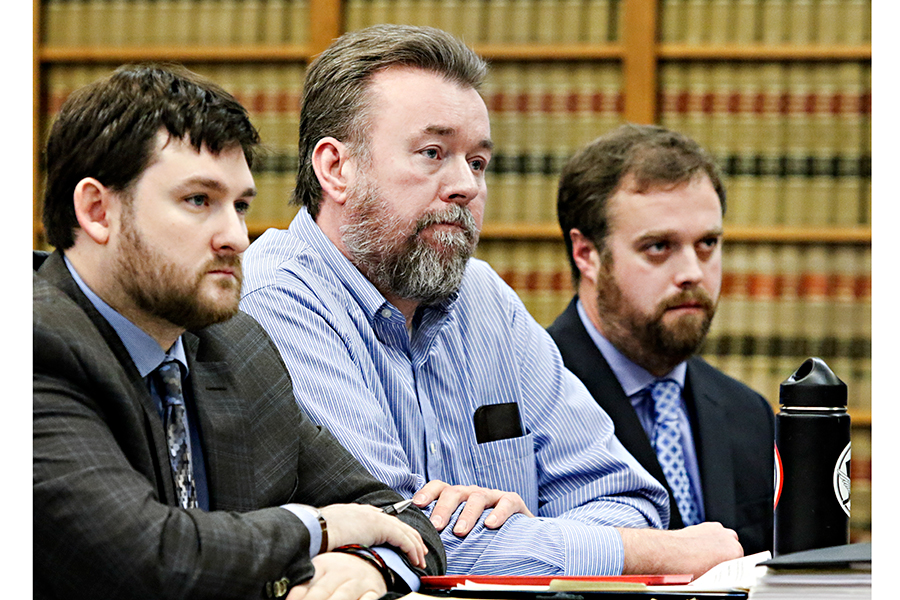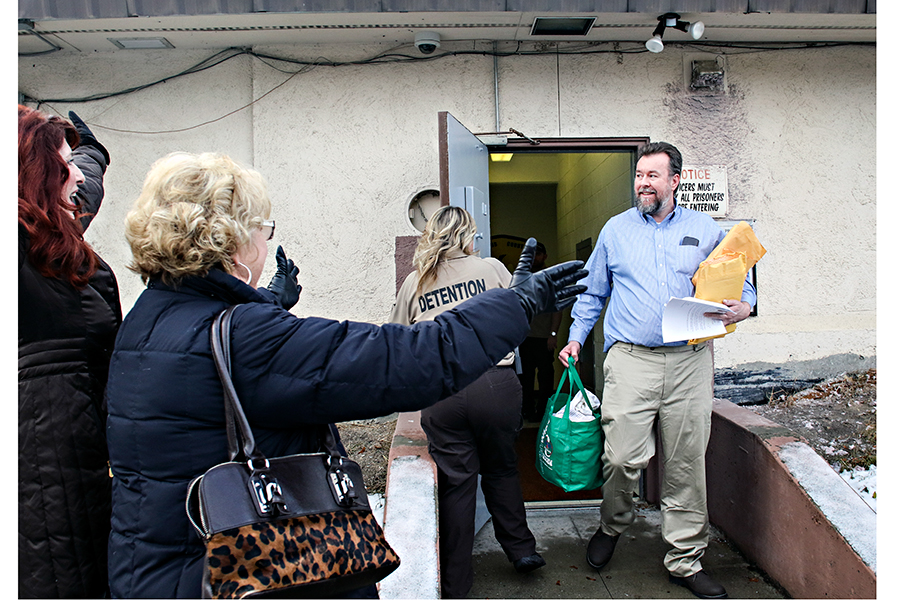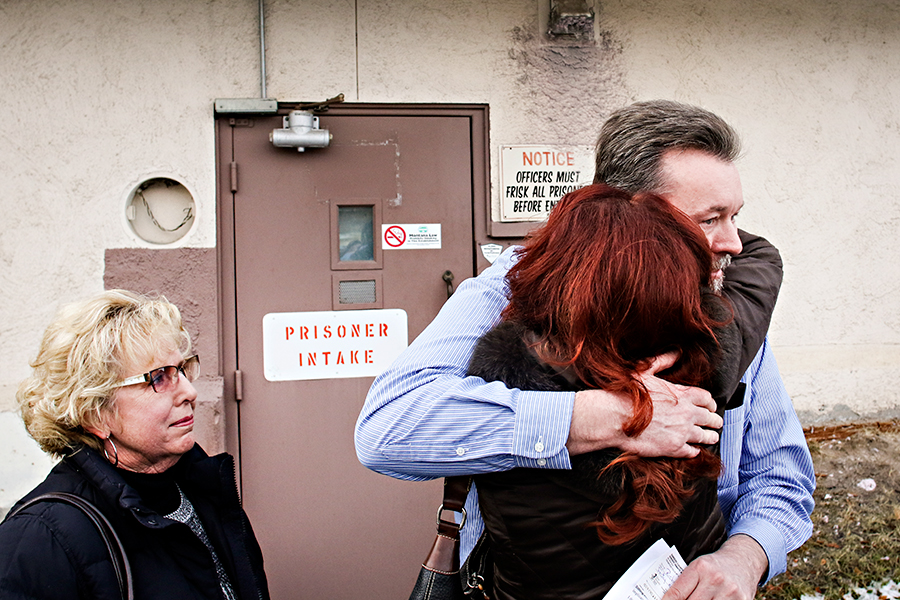It’s been more than three years since Richard Raugust was released from prison, but he’s still discovering the true price of freedom.
In civilian life, the costs continue to mount for Raugust, who lost 18 years of his life for a wrongful conviction, locked up for a crime he didn’t commit during a period when most people are building careers, saving money, having families, opening investment plans.
He still agonizes over the nearly two decades he spent in prison, convicted erroneously by a Sanders County jury and sentenced to life in prison for allegedly murdering his best friend in Trout Creek, but now that he’s cleared his name there are more pressing things to fret over.
At 53, he worries about finding a job and paying the bills. He worries about his health, which deteriorated during his time incarcerated, a life confined to tight spaces, sustained on cafeteria food and artificial light, deprived of exercise, wrongfully warehoused for a crime that devastated him emotionally. He worries about buying groceries, which these days he says consist of “a lot of beans and ramen,” and he worries about how he’s perceived by prospective employers and book publishers (Raugust wrote a collection of poetry titled “Fishers of Trout and Men” while he was in prison and self-published it upon his release, and he’s compiled seven other collections). He worries about his 24-year-old stepson, who is autistic and needs constant care.
Raugust worries about all the day-to-day challenges normal people worry about, only his situation is anything but normal.
In an effort to rectify the financial side of the grave injustice dealt to him, Raugust recently filed a claim with the state of Montana seeking nearly $97 million in monetary compensation for the loss of his liberty, including damages surrounding what the Montana Innocence Project revealed to be a shoddy criminal investigation and a case riven with prosecutorial misconduct and flawed legal proceedings.
“I’m getting by, but just barely. I get some money from the book, but it’s by the skin of my teeth,” Raugust, who lives in Chula Vista, California, said. “There is no dispute that my rights have been violated, and yet I’m sitting here three years after I was freed and the magnanimous state of Montana hasn’t given me so much as a can of beans. It’s frustrating.”

Raugust, whose 1998 conviction for the murder of Joseph Tash was overturned on Nov. 16, 2015 by a district court judge, was released from prison the following December. He lived in an apartment in Missoula awaiting the resolution of his case while the state appealed the district judge’s ruling to the Montana Supreme Court. The state eventually dropped its appeal and the Sanders County Attorney’s Office dismissed the charge, effectively exonerating Raugust.
It’s vindication for Raugust, who spent the 18 years he was confined to a cell at the Montana State Prison in Deer Lodge slowly mounting a case for his innocence before the Montana Innocence Project took up his case in earnest.
But in the time that’s passed since he emerged from the Sanders County Courthouse and into the open arms of his mother, Marci, and sister, Mary — his first embrace as a civilian in all that time — the odds have continued to stack up against Raugust.
“It’s tough, you know, trying to get back on your feet after so long,” he said. “Prison ages you pretty quickly and I’m in a lot of physical pain without any assistance.”
According to Raugust’s demand letter, which he submitted to the state Department of Administration’s Risk Management and Tort Defense Division, the state committed the “grossest miscarriage of justice our society can offer.”

The letter is a necessary procedural step for an exoneree who intends to file a civil lawsuit against the state, a step Raugust plans to take if the state refuses to settle for “damages, detriment and continuing injury against my person by numerous state and county actors acting under the color of state and federal law, to include but not be limited to: abuse of judicial process; denial of procedural due process; denial of substantive due process; malicious prosecution; denial of numerous constitutional rights; conspiracy to deprive constitutional rights; fabrication of evidence; denial of an impartial jury; denial of a fair trial; witness manipulation; witness tampering; jury tampering; withholding exculpatory evidence; deliberate indifference to my serious medical needs; clear departures from the accepted standards of health care; conditions of confinement; cruel and unusual punishment; and others to be named later.”
Raugust says he was unfairly punished and retaliated against, denied access to the outdoors, deprived of sunlight and inflicted with “physical, psychological and emotional pain and suffering.”
For those reasons, his demand letter requests $1 million per year from July 24, 1997 to the date the complaint is settled, or $22 million; $7 million in punitive damages; $2 million in attorneys’ fees; lifetime medical costs and all related expenses; any and all statutory remedies deemed appropriate; treble damages for deceit; and any and all other damages allowed by state law, and such other and further relief a court or jury may deem just and proper — a figure Raugust’s legal team estimated to be about $97 million.
The reason that Raugust is taking such dramatic steps to hold the state accountable for its mistake is twofold — his constitutional rights were violated, but it’s also his only option for recourse in his situation.

That’s because Montana does not have a program in place to provide monetary compensation to exonerees; although it is one of 35 states, in addition to Washington, D.C. and the federal government, that provides compensation, it does so only in the form of educational aid. Still, because the program enacted in 2003 has never been funded, and only applies to inmates exonerated based on DNA evidence, it effectively does not exist.
A resolution passed in the 2019 Montana Legislature, carried by Rep. Joel Krautter, R-Sidney, established an interim study that instructs members of the Law and Justice Interim Committee to examine the potential for a state system providing monetary compensation for the wrongfully incarcerated.
“We have been working closely with the interim committee, which is meeting again in September to finalize the agenda for the next year-and-a-half, and we are optimistic that the monetary compensation study will be taken seriously by its members,” Frank Knaack, executive director of the Montana Innocence Project, said.
The national landscape of monetary compensation for exonerated people varies widely, with Washington, D.C. doling out $200,000 annually to wrongfully convicted inmates who have been freed, and other states capping the overall amount, or adjusting it on a sliding scale based on the duration of the wrongful imprisonment.
Knaack favors the program in Kansas, which is one of nine states that contributes more than $50,000 to exonerated people. In Kansas, exonerees receive a payment of $65,000 for every year of wrongful incarceration, which Knaack says is a good place to start.
“One thing to make clear is this is not something that is ever going to make exonerees whole,” Knaack said. “That is impossible. But this is a way for individuals who are coming out of prison and re-entering society to help them.”
Under Montana’s current law, the only way for wrongfully convicted people to obtain compensation is through litigation, which takes years to resolve.

“And in the meantime they have no food, no housing and they can’t afford the basic necessities that you need to survive,” Knaack said. “Often times families are bankrupted in this process. They’re spending money on lawyers and have other costs.”
Enacting a monetary compensation program wouldn’t and shouldn’t preclude all civil litigation by exonerees, Knaack said, particularly in cases where state prosecutors hid evidence or committed serious constitutional violations. But it would provide an alternative channel for financial remedies, he said.
“The exoneree should absolutely have the right to seek justice,” he said. “But right now people go the civil suit route because it is the only way to go. And the problem is it takes years to resolve.”
Moreover, the cost of settling a lawsuit with an exoneree often exceeds the cost of a monetary compensation program. Take Jimmy Ray Bromgard, for example, a Billings man who spent more than 15 years in prison for a child rape that he didn’t commit, and who settled his lawsuit against the state of Montana for $3.5 million, the largest amount the state has ever paid to an individual for its misconduct, barring cases in which the victim of the misconduct is deceased.
Raugust said a monetary compensation program would be a life-changing development, even if he believes he deserves more. He said after learning of the interim study, he wrote Krautter, the representative who introduced the resolution, to thank him.
“I really appreciate him taking notice and doing everything he can to get it done,” Raugust said. “A wrongful conviction is something that forever changes a person’s life, even if they are exonerated.”
The guilty verdict that forever changed Raugust’s life was handed down in March 1998 by a Sanders County jury, which sat deadlocked for 10 hours before reaching a unanimous decision late at night, though some jurors, including the jury foreperson, say they weren’t convinced of Raugust’s guilt, that they capitulated only after the judge instructed them that a new trial would be too costly for the state and county to bear — a statement omitted from the trial transcript but recalled by, among others present in the courtroom, Mary Harker, the pastor of the Whitepine Community United Methodist Church in Trout Creek, who served as foreperson of the jury.
“I do remember the judge saying it would be too expensive and costly to hold another trial and the county could not afford it. I considered this in making my decision, and I remember the jury talked about the expense of a new trial, which was one of the pressures that led me to vote to convict Richard Raugust even though I believed the evidence presented at trial did not prove him guilty beyond a reasonable doubt,” Harker explained in a sworn affidavit. “The instructions given to us by the judge did not leave me with the belief I could disagree with the rest of the jury, the way the judge put it, it seemed like a lost cause.
“This has been on my mind and on my heart ever since that jury service,” she continued. “It rises up and troubles me in the night. I was shocked at the way it ended and thought it was a miscarriage of justice.”
From the moment of his arrest, Raugust insisted that he did not murder Tash at a remote campsite the two men shared near Trout Creek, and his story has never wavered.
In 2009, a legal team assembled by the Montana Innocence Project took notice of Raugust’s claims and began fighting for his innocence. Convinced he was wrongfully convicted, the defense team unearthed new evidence supporting Raugust’s alibi, as well as evidence that the state’s key witnesses committed the crime and colluded to frame Raugust for Tash’s murder.
Sanders County District Judge James Wheelis ruled that evidence withheld in the case constituted a violation of due process, supported the defendant’s alibi and warranted a new trial.
“Richard Raugust spent 6,708 days, which amounts to 18 years, four months, and 11 days, behind bars for a murder we believe he did not commit,” his pro bono attorney, Brett Schandelson, said. “For these many years, justice was not served for Richard or for the family of Joe Tash, Richard’s longtime friend who was murdered.”
Raugust keeps in touch with Tash’s brother, Ed, who he says is still irate over how the state handled the investigation into his brother’s death.
“He wants to come out to Montana and picket at the capitol,” Raugust said. “He wants justice for Joe’s death.”
Although exonerations are a rare development in the United State criminal justice system, and an even rare one in Montana, other pending civil actions involving wrongfully convicted men include Cody Marble, Richard Burkhart, Fred Lawrence and Paul Jenkins, all whose cases Raugust follows closely.
“These other guys, some of them are worse off than me in terms of their health,” he said. “And just because you’ve been exonerated doesn’t mean that people don’t look at you differently. There’s always going to be a shadow over me that makes life more difficult.”
One thing that makes life less difficult is the work he does counseling veterans, handing out copies of his book, which he describes as an artistic effort to reach veterans and curb suicide rates through tales of trout fishing, which is what drew him to Montana so many years ago.
“A lot of these guys are ready to call it quits and I say, ‘Hey, pump the brakes,’” he says. “I tell them my story and send them a book and they tell me that it saved them. That’s pretty inspiring.”
